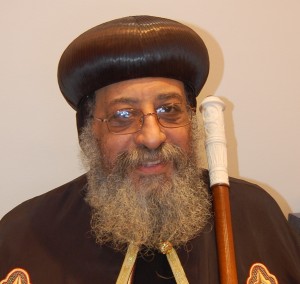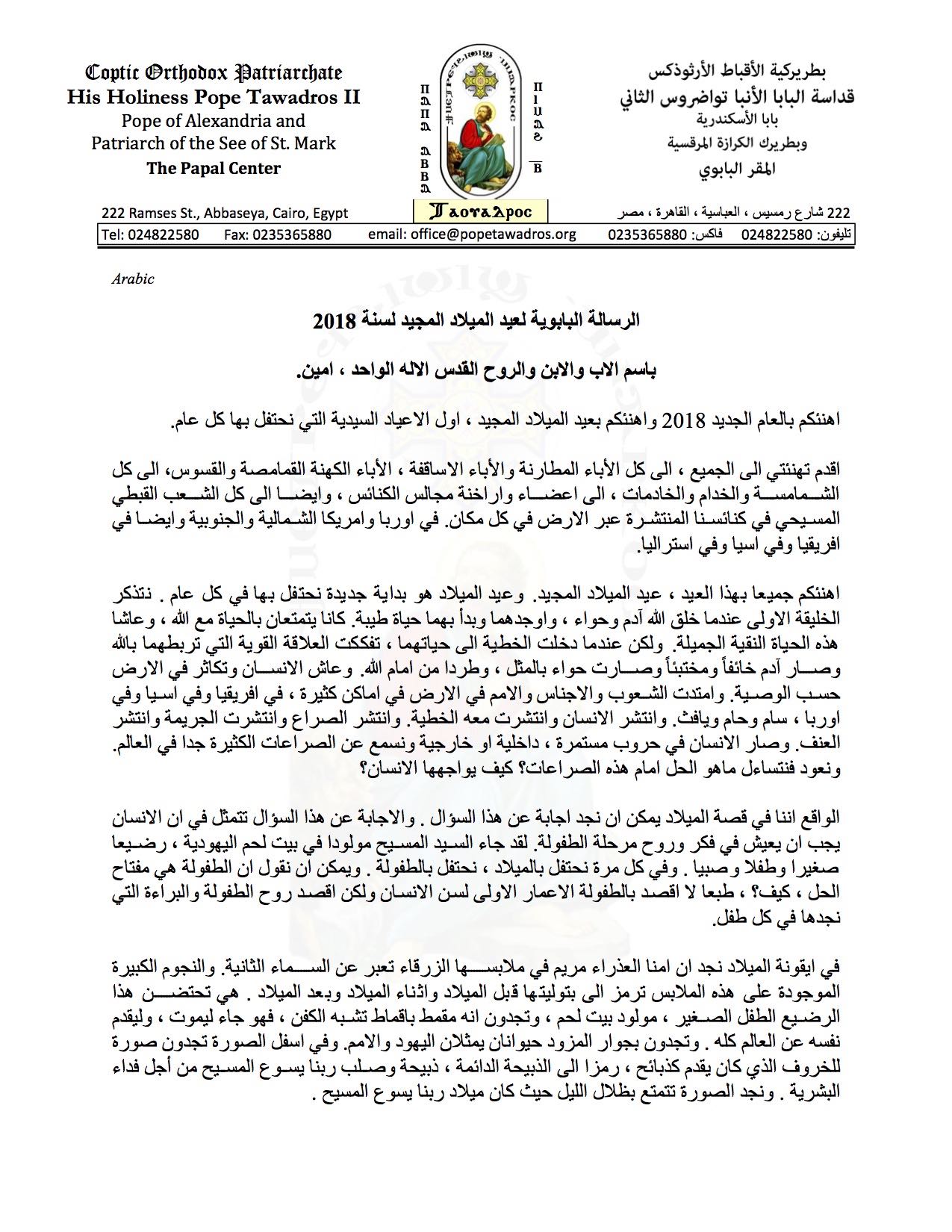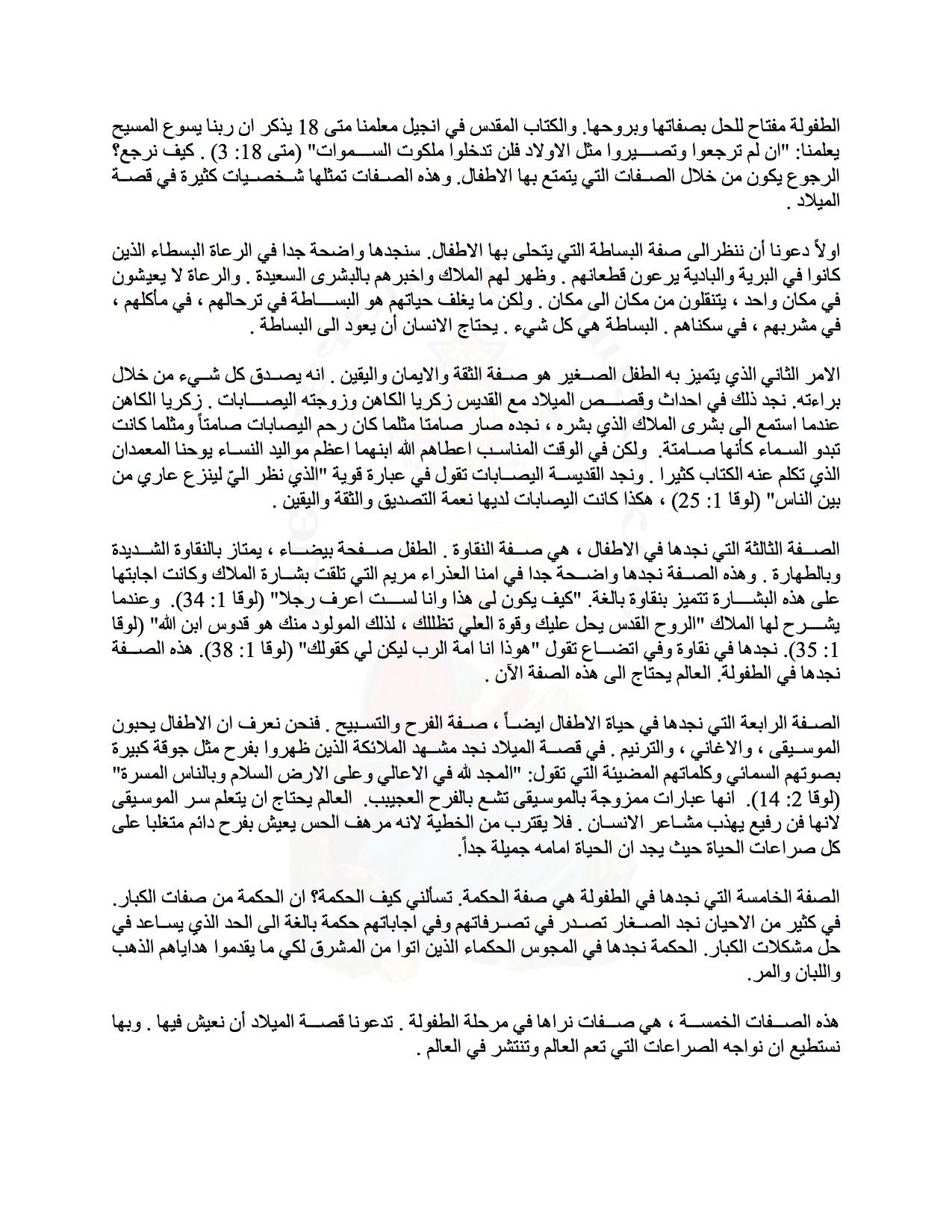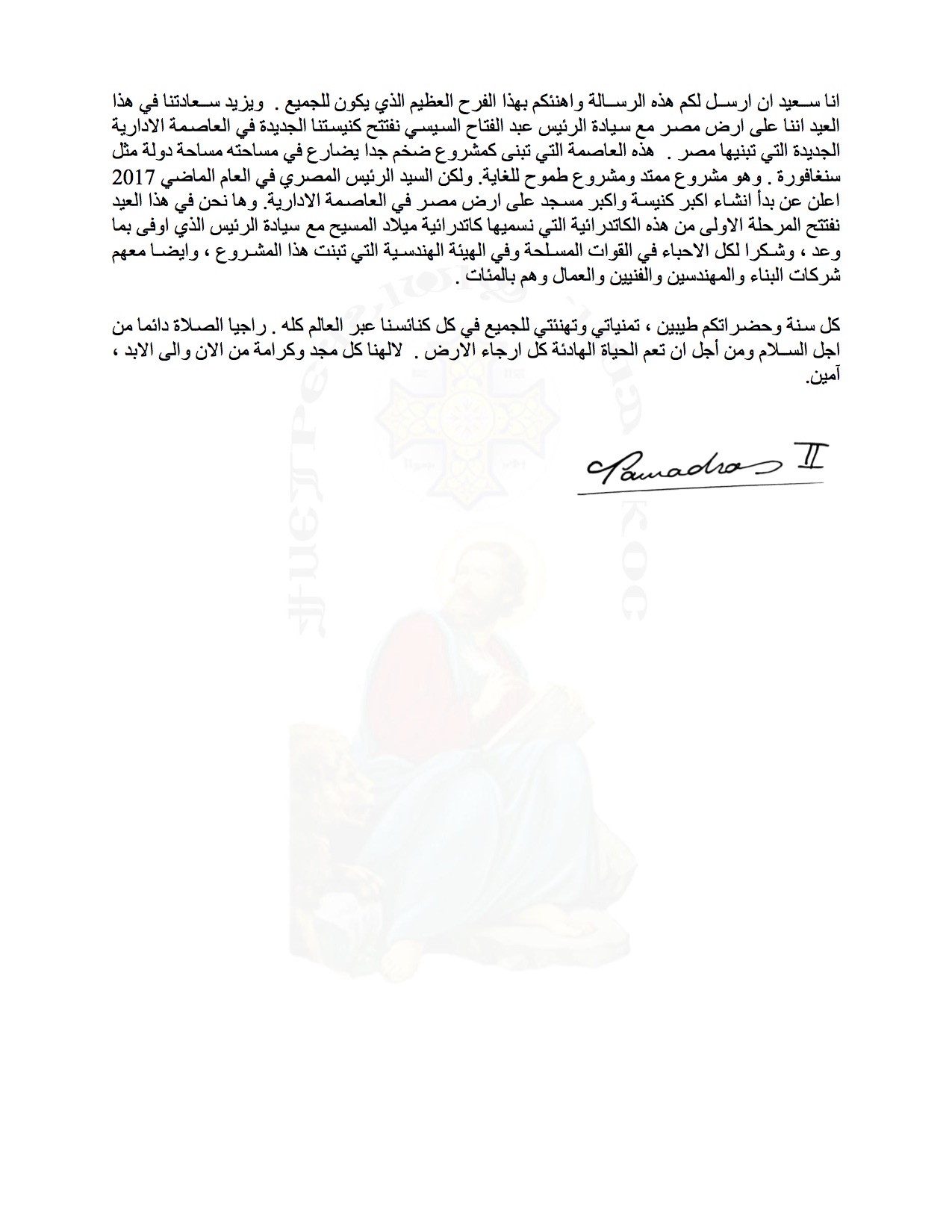The Feast of Nativity 2018

7th January 2018
Papal Message
His Holiness Pope Tawadros II
Pope of Alexandria and Patriarch of the See of St. Mark
In the Name of the Father, the Son, and the Holy Spirit, One God, Amen.
I congratulate you on the New Year 2018 and on the glorious Nativity, the first of the Lord’s feasts that we celebrate every year.
I extend my congratulations to all: the fathers the metropolitans, the bishops, the hegumens, the presbyters, The deacons, the ministers, the servants, the members of the churches boards and to all the Coptic Christian people in our churches worldwide, In Europe, North and South America, Africa, Asia, and Australia. I congratulate you all on this feast, the feast of the glorious Nativity.
Christmas is a new beginning celebrated annually. We recall the first creation when God made Adam and Eve, gave them existence, and began a good life with them. They enjoyed life with God and lived it in purity and beauty. But when sin entered into their lives, it shattered their strong relationship with God. Adam became fearful and hid himself, and Eve likewise. They were cast away from God’s presence. Man lived and multiplied in the land according to the commandment, and many nations and races spread all over the world. To Africa, Asia, and Europe went Sham, Ham, and Japheth. Humanity spread as did sin, conflict, crime, and human violence. Man struggles in constant war, both internal and external. We hear of many conflicts in the world. We ask ourselves: What is the solution when confronting these conflicts? How should humanity face them?
In fact, in the story of the Nativity, we can find an answer to this question. The answer to this question is that man must live in the thought and spirit of childhood. Jesus Christ was born in Bethlehem of Judea a little infant. Then He grew up to a toddler, then a young boy. Every time we celebrate the Nativity, we celebrate childhood. We can say that childhood is the key to the solution. How? Of course, I do not mean childhood, the first years of human life, but I mean the spirit of childhood and the spirit that we find in every child.
In the icon of Nativity, our mother the Virgin Mary in her blue clothes represents the second heaven. The big stars on her clothes symbolize her virginity before, during, and after birth. She embraces this little baby, who was born in Bethlehem and wrapped in swaddling cloths that look like burial cloths. He came to die and to offer Himself on behalf of the whole world. You will find two animals beside the manger representing the Jews and the Gentiles. At the bottom of the icon you will find a picture of a lamb, which used to be offered as a sacrifice. It was a symbol of the eternal sacrifice, which is the crucifixion of our Lord Jesus Christ for the redemption of humanity. In the icon, we see a shadow, the night of the birth of our Lord Jesus Christ.
Childhood is the solution to the problem by its characteristics and its spirit. The Holy Bible in Matthew 18 mentions that our Lord Jesus Christ teaches us: “Unless you are converted and become as little children, you will by no means enter the kingdom of heaven.” (Matthew 18:3). How do we return?
The return should be through the characteristics manifested in children. These charactertics are found in many personalities at the story of the Nativity.
First, let us look to the simplicity of children. We will find it very clearly manifested in the simple shepherds who were in the wilderness and the fields herding their flock. The angel appeared to them and gave them glad tidings. Shepherds do not live in one place. They move from place to place. However, simplicity is shown in their travel, food, drink, and housing. Simplicity is everything. A person needs to return to simplicity.
The second thing that characterizes children is trust, faith, and confidence. The child believes in everything because of his innocence. We find this in the events and stories of the Nativity such as with St. Zakaria the priest and his wife Elizabeth. When Zechariah the priest listened to the proclamation of the angel, he became silent like Elizabeth’s womb that became silent too. Likewise, the heavens seemed to be silent. Yet at the right time, God gave them the greatest son born of women, John the Baptist who Scripture spoke of much. St. Elizabeth, in a strong statement, said, “He looked on me, to take away my reproach among people.” (Luke 1:25) Thus, Elizabeth had the belief, trust, and confidence.
The third quality that we find in children is purity. The child is a white page, characterized by extreme purity of heart. We find this quality very clearly in our mother the Virgin St. Mary, who received the angel’s annunciation and responded to it with great purity. “How can this be, since I do not know a man?” (Luke 1:34). When the angel explained to her, “The Holy Spirit will come upon you, and the power of the Highest will overshadow you; therefore, also, that Holy One who is to be born will be called the Son of God.” (Like 1:35). We find her in purity and humility responding: “Behold the maidservant of the Lord! Let it be to me according to your word.” (Luke 1:38). We find this characteristic in childhood. The world needs this trait now.
The fourth quality that we find in the life of children is the attribute of joy and praise. As we all know, children love music, songs, and singing. In the story of the Nativity, we find the story of the angels who appeared with joy. They were like a great choir in this heavenly song with these words: “Glory to God in the highest, And on earth peace, goodwill toward men!” (Luke 2:14). It is a powerful phrase filled with joy and in which there is music. The world needs to learn music because music is a very refined art. When a person learns music, he can avoid sin because music heightens a person’s senses. When a person learns music, and when he lives in constant joy, he finds that his life is a beautiful life and that he can overcome all conflicts.
The fifth characteristic we find in childhood is the attribute of wisdom. You ask me: “Wisdom, how? Wisdom is for adults!” Many times the young children in their answers and their behaviors show great wisdom. Perhaps the wisdom of children helps solve the problems of adults. We find wisdom in the wise Magi who came from the East in order to offer their gifts of gold, frankincense, and myrrh.
We find these five characteristics in childhood. The story of the Nativity invites us to live in them. Through them, we can confront the conflicts that are pervasive and widespread throughout the world.
I am happy to send this message to you and to congratulate you on this great joy, which is for all. On the land of Egypt with President Abdel Fattah Al-Sisi, we are even more joyous that in this feast we are opening a new church in the new administrative capital, which Egypt is building. This capital, which is built as a very large project in the size of a country like Singapore, is a long-term and very ambitious project. Last year 2017, the Egyptian president announced beginning the establishment of the largest church and the largest mosque in the land of Egypt in the administrative capital.
On this feast we open the first phase of this cathedral, which is called the Cathedral of the Birth of Christ, with the president, And with all the loved ones in the armed forces and in the engineering firm that adopted this project with construction companies, engineers, technicians, and workers in the hundreds.
Merry Christmas. My best wishes and congratulations to all our churches across the world. I am requesting unceasing prayer for peace, and that a tranquil life may pervade the whole world. To our God is all glory and honor, from now and forever, Amen.
(Signed)
His Holiness Pope Tawadros II
Feast of Nativity 2018











